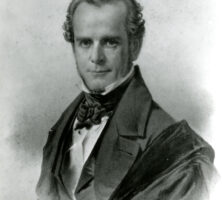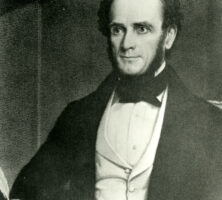Thomas Butler King is remembered primarily as a planter/politician from coastal Georgia who labored with mixed success to improve the nation’s nascent transportation and communication networks.
King was born in Palmer, Massachusetts, the son of Daniel and Hannah Lord King. He attended Westfield Academy in Massachusetts and studied law under his brother Henry in Allentown, Pennsylvania. In 1823 he followed another brother, Stephen Clay King, to southeast Georgia and took up the practice of law. In 1824 he married Anna Matilda Page, the daughter of a wealthy cotton planter who owned Retreat Plantation on St. Simons Island. After the deaths of Anna’s parents, the Kings made Retreat their primary home. They had ten children who survived to adulthood. King made substantial improvements to the Retreat property and in the 1820s managed to accumulate other neighboring lands and plantations. He subsequently lost these properties to his creditors, however, when the long-staple cotton economy fell on lean times in the 1830s and his own investments in various internal improvement schemes came to nothing.

King was never particularly content with planting, preferring politics and public life. Elected to the Georgia legislature in 1832 as a senator from Glynn County, King served almost continuously until his election to the U.S. House of Representatives in 1838. As a state senator, King spent most of his energy promoting internal improvements, his lifelong passion. He supported state credit for private companies generally and improvements for the port at Brunswick specifically, then deemed as viable a candidate as Savannah for becoming Georgia’s primary seaport. Once elected to the U.S. Congress, King allied himself with the Whig Party, continued the promotion of internal improvements (including a railway across the isthmus of Panama), and became a vocal champion of America’s infant navy.

Bitterly disappointed at not being appointed secretary of the navy under U.S. president Zachary Taylor, King accepted an appointment as Taylor’s special agent to California. King stayed on in California as collector of the Port of San Francisco under U.S. president Millard Fillmore, failing twice in bids to represent the new state as a U.S. senator. King’s travels from East Coast to West Coast and his long-time affection for internal improvements made him a natural proponent of the Southern Pacific Railroad Company. Throughout the 1850s he worked tirelessly as its lobbyist and representative.
Finally, King returned to Georgia in 1859 to bury both his oldest son, Thomas Butler King Jr., and his wife, Anna. In 1861 he accepted the post of Georgia’s representative to the courts of Europe and again left his plantation in the hands of his overseer and his fractured family. King returned to Georgia in 1862 and died in Waresboro (in Ware County) on May 10, 1864.








